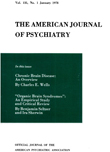Abstract
1. A series of 125 late post-traumatic syndromes have been compared to 70 cases with acute head injuries, 30 cases with brain disease, and 40 psychoneuroses. The methods of investigation comprised: complete neurological, psychiatric, electroencephalographic and radiological study; investigation of respiratory and circulatory functions under basal conditions and during work; determination of muscular tension and endurance under stress; complete laboratory work-up including blood status, determination of non-protein nitrogen, blood cholesterol and urine examination. Oral glucose, intravenous insulin, intramuscular epinephrine, oral galactose tolerance tests, and intravenous galactose clearance tests were carried out on varying numbers of patients. Intelligence test, the Minnesota multiphasic personality inventory and a complaint scale, dark adaptation, negative after images, tachistoscopic examination and reaction time studies were also carried out.
2. The common features of late post-traumatic syndromes were the abnormal high score on the neurotic scales of the Minnesota multiphasic personality inventory and the large number of diffuse complaints. Related to the presence of brain damage in chronic head cases were increase in metabolism and muscular tension, decrease of intelligence, delayed return of sugar values to the base line in insulin and glucose tolerance tests, increase in white blood count, insufficient increase of the pulse rate during stress and after injection of epinephrine. Related to the presence of neurotic tendencies were higher intelligence, greater ventilation volume, irregularity of breathing and decrease of endurance to stress.
3. Comparison of late post-traumatic syndromes with acute head injuries and cases with brain disease on the one hand, and psychoneuroses on the other, revealed that chronic head cases without signs of brain damage resemble the psychoneuroses and often cannot be distinguished from these. Chronic head cases with neurological signs are in many respects closer to the acute cases and resemble the psychoneuroses less.
4. In late post-traumatic conditions, the importance of organic damage to the brain has been widely overrated. While cases with severe brain lesions improve as time goes on, post-traumatic conditions without signs of cerebral damage tend to become worse. The longer a post-traumatic syndrome lasts, the less likely it is to be an expression of brain damage, and after one year following the accident most post-traumatic conditions constitute personality problems, convulsive disorders excepted.
5. The post-traumatic personality is a determining factor for delayed or definitely postponed recovery following head injury. While overt and social maladjustment is related to accident-proneness, covert maladjustment, conflicts and dissatisfaction seem to be associated with prolonged convalescence and post-traumatic physical symptom formation.
6. Abnormal states of mind associated with intoxication, excitement, hatred, fear, guilt or other emotions predispose to accidents. While in some cases the injury may act as a release and solution for an unbearable situation, the environmental conditions and the subject's state of mind after the injury are in many instances the same as before the accident. The same circumstances which may lead to accidents seem therefore to predispose to delayed recovery.
7. While the therapy of convulsive disorders, subdural hematomas, brain abscess, paralysis of cranial nerves and extremities follows traditional lines, the psychiatric treatment of late post-traumatic conditions has to start with the prevention of these syndromes in the acute stage. Attention should be directed at investigation of the state of mind prior to the accident. Pre-traumatic difficulties of adjustment, or immediate post-traumatic signs of anxiety, hysteria, or hypochondriasis should be approached with psychotherapeutic measures. The patient's realization of the presence of pre-traumatic personality difficulties and awareness of the responsibility in the causation of the accident seems to favor recovery. Less successful, but quite amenable to psychotherapy are cases with post-traumatic syndrome of longer standing seen weeks or months following the injury.

